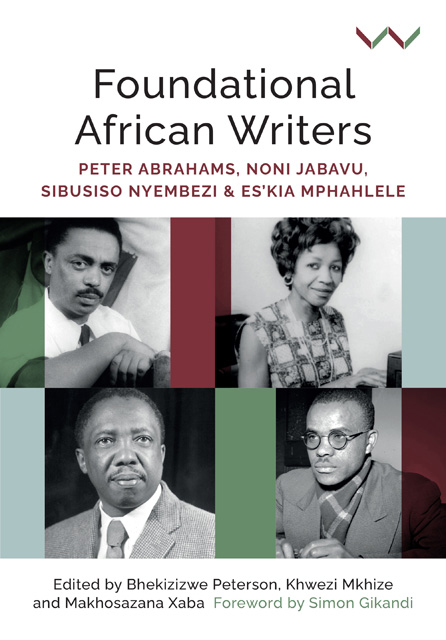Book contents
- Frontmatter
- Contents
- List of illustrations
- Foreword
- Acknowledgements
- Tribute to Professor Bhekizizwe Peterson
- Introduction
- Part I Remapping and Rereading African Literature and Cultural Production
- Part II South Africa and Fugitive Imaginaries
- Part III In the Eye of the Short Century: Diaspora and Pan-Africanism Reconsidered
- Contributors
- Index
3 - Situating Sibusiso Nyembezi in African Literary History
Published online by Cambridge University Press: 01 September 2022
- Frontmatter
- Contents
- List of illustrations
- Foreword
- Acknowledgements
- Tribute to Professor Bhekizizwe Peterson
- Introduction
- Part I Remapping and Rereading African Literature and Cultural Production
- Part II South Africa and Fugitive Imaginaries
- Part III In the Eye of the Short Century: Diaspora and Pan-Africanism Reconsidered
- Contributors
- Index
Summary
It was not unusual for a black South African writer writing in an African language in the 1930s to the early 1960s to move almost seamlessly between different modes of writing and, indeed, different worlds. There is, of course, a historical explanation for this, that is, the nature of Africans’ encounters with and responses to colonialism and colonial modernity. However, whereas African writing in English was enthusiastically received in reviews and critical scholarship, particularly in what came to be called Commonwealth and, later, postcolonial literature and criticism, African-language writing remained the formative ‘oral’, ‘vernacular’ or ‘native’ influence behind African writing in English. As Karin Barber observes in ‘African-Language Literature and Postcolonial Criticism’, ‘the positioning of “oral tradition” as precursor suggests a view of literary history in which the oral forms had no function other than to be superseded by the “modern”, “emergent” ones’. Barber notes that this critical attitude, whose origins she traces back to ‘Commonwealth criticism of “African literature”’, has continued well into contemporary ‘postcolonial criticism’, which, as she argues, has led to a ‘binarized, generalized model of the world which has had the effect of eliminating African-language expression from view’. This attitude is also the subject of Jabulisile Mhlambi’s critique of the conventional approaches to the study of African-language literatures and cultures, which ‘looked at tradition as in various stages of disintegration and therefore requiring preservation in the face of modernity’. She proposes, instead, an approach in which ‘artistic forms in indigenous writing are not categorised into the oral and the written’ but rather ‘focus on the significance and relevance of repetitions, anecdotes, jokes, allusions, parody, overlaps and the migrations and recycling of textual elements in particular contexts’.
In this chapter, I argue that a careful consideration of Sibusiso Nyembezi’s life and work, particularly the life of his work, not only complicates the colonial and postcolonial historical and literary-historical trajectories, but also radically alters the claims that have been made about Africa’s and Africans’ encounters with colonialism and colonial modernity.
- Type
- Chapter
- Information
- Foundational African WritersPeter Abrahams, Noni Jabavu, Sibusiso Nyembezi and Es'kia Mphahlele, pp. 75 - 94Publisher: Wits University PressPrint publication year: 2022



